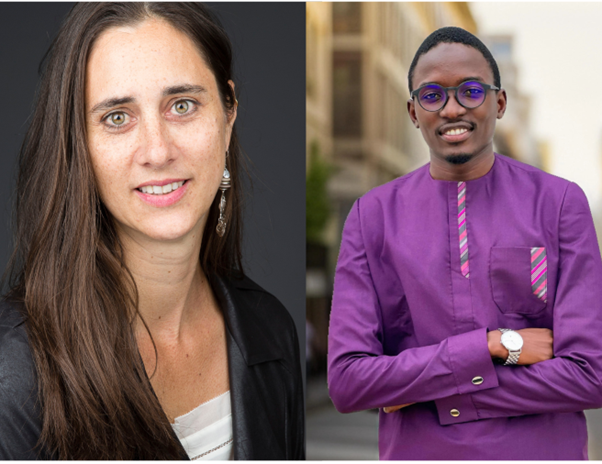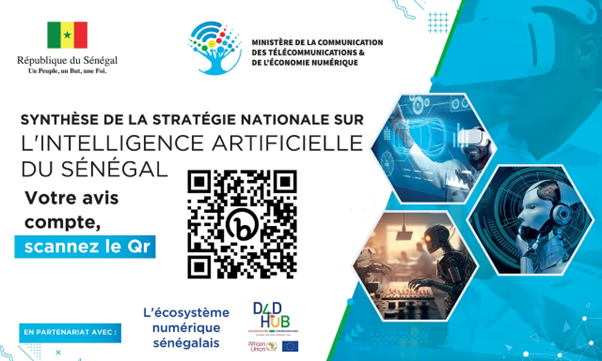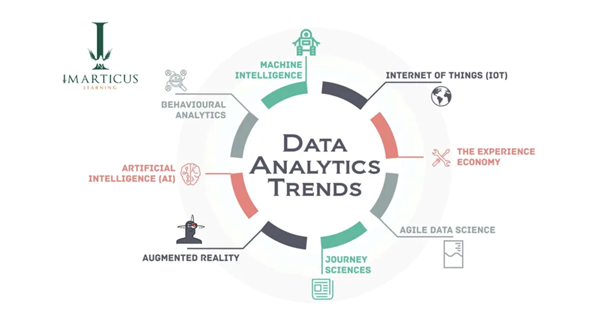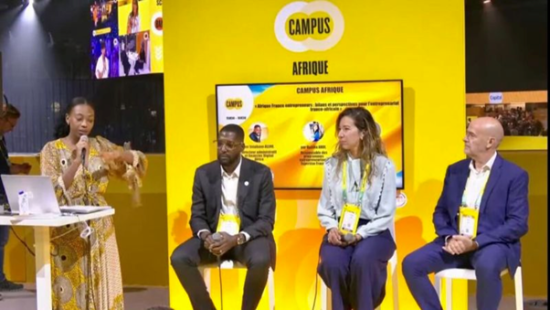
At Emerging Valley, the Euro-African innovation event, you took part in a panel discussion on the role of artificial intelligence (AI) in Africa's economic transformation. What motivates Expertise France’s interest in these issues?
Séverine Peters-Desteract: Expertise France has been involved in innovation issues for several years. Surprisingly, people ask us why we are interested in these issues. Some people think that Africa has other priorities. I think we are coming to the end of a certain model of cooperation. Innovation is an opportunity to take a different approach. When it comes to artificial intelligence, there is no skills gap between a Senegalese start-up and a French start-up. There may be a technology developed on one side or the other, and a knowledge of the territory. These issues are very conducive to a new partnership approach. The Senegalese government asked us to help them develop their artificial intelligence strategy through the European AU-EU Digital4Development Hub project.
How did this collaboration go?
Séverine Peters-Desteract: We worked with our European partners to mobilize national expertise specialized in these issues. Our role was to coordinate the various key players in the Senegalese ecosystem: academics, institutional representatives and the private sector. When you're working in a country, you always have to make sure that you're in tune with their needs and expectations in terms of support. That's why working with these stakeholders, including young researchers like Derguene Mbaye, has been invaluable in ensuring that the ecosystem can take ownership of this strategy, in the knowledge that the future will come from these young people, from this continent that offers so many opportunities. At the same time, we also produced our own positioning note to ask ourselves questions about our practice, positioning and contribution to the sector. This note was written in collaboration with a committee of African researchers and specialists. It has enabled us to refocus on local realities to ensure that our vision of the sector is aligned with that of our partners, which is essential for the success of our projects.

Derguene Mbaye: When the Senegalese Ministry of Digital Economy started working on its AI strategy, it surrounded itself with a number of players, including Expertise France. As I was already active in the ecosystem, I was involved. It was a real process of collective intelligence, bringing together the whole ecosystem. Because, as we said, AI should not only be a matter for experts, but also for policy makers, entrepreneurs and so on. To take all the opinions and integrate them into the strategy.
"At the time, we were already talking about the language model, with the technology at the heart of ChatGPT”
Derguene Mbaye, you are a pioneer in the popularization and promotion of AI in Senegal. What are you doing?
Derguene Mbaye: I'm a research engineer in artificial intelligence, specializing in the automatic processing of languages, particularly Senegalese languages such as Wolof. I work for a company called Baamtu, which specializes in AI, software development and big data, where I do R&D (research and development). At the same time, I'm doing a thesis at the Ecole Supérieure Polytechnique in Dakar. I'm also supported by Google through a mentoring program. Finally, I co-founded GalsenAI, the largest artificial intelligence community in Senegal, with two thousand active members. We do a lot of promotion and outreach activities in partnership with Google. And we also work on open source projects. Since 2018, we have been working on popularizing the technology. Back then, we were already talking about the language model, the technology at the heart of ChatGPT. We've carried out a series of activities with companies such as Nespresso, who explored their first use case for AI as part of a challenge: the aim was to observe and predict the behavior of competitors. We organized a competition with a telecom operator, inviting the community to design tools. The winners were offered the chance to join the company. These are some concrete examples.
You see linguistics as a key challenge for AI. Why is that?
Derguene Mbaye: The huge potential of AI has been the subject of many articles and commentaries. Today, the breakthrough of AI in Africa will be through languages. Today, there are more than seven thousand languages in the world, a third of them on the continent. In a small area, there can be a very high concentration of languages, most of which are only spoken. WhatsApp's meteoric rise in Africa can be explained by its use of voice. There is no language barrier. If we can now get illiterate people to use these applications in their own language, it can bridge the gap and have a huge impact on digital inclusion and financial inclusion. In addition, most African countries are lagging behind in terms of digital consumption. This backwardness puts us at a disadvantage when it comes to collecting the data we need to develop applications that reflect our image. I believe that AI can create a virtuous circle to bridge this divide. In Senegal, for example, there is a project with the European Union to digitize the public administration. It starts with digitizing existing documents. Imagine thousands of papers that need to be digitized, and doing it manually would be time-consuming. AI, and in particular the use of optical recognition, can make this easier and faster.
"Women, for example, are very underrepresented in data processing"
Séverine Peters-Desteract: "At Expertise France, we talk about 'sober' innovation. This covers a wider field than technology, such as social innovation. We are a development agency. We have to meet the objectives of poverty reduction. As far as AI is concerned, Derguene Mbaye is right. What we're increasingly hearing and what will be more in demand is a greater amount of data on minorities. Women, for example, are very underrepresented in data. So are certain cultures and languages. Hence the interest in Derguene's work on linguistics. By working on accessibility through language, we will have real cultural data to feed into tools like ChatGPT, which will no longer respond like a white man over fifty.
Should this cooperation in Senegal be replicated elsewhere?
Séverine Peters-Desteract: French expertise is still in demand. We hope that the Senegalese example can serve as a model, because it's important for us to have an AI strategy that comes from the field. Our more general goal for AI would also be to be able to lead a whole network of researchers and managers on this issue at a global level. We are also thinking about applying the collaborative model that we set up for both the Senegalese national strategy and our own position paper to other issues and other structures. We are also working on training and curriculum issues to create partnerships in this area. With AI, there is an opportunity to create links with companies that are doing research themselves in order to meet the challenges.
Derguene Mbaye: The youth of the African continent is seen as an asset. But, on a personal level, I'm in contact with startups that are struggling to recruit profiles that are suited to their needs. It's a major challenge to strengthen the skills of young people in the digital and AI fields. Strong guidelines have been included in Senegal's strategy in this area. And we are currently looking at concrete programs to meet this demand, with Expertise France.
"Is it possible today to do without the Gafams?”
What are the other challenges linked to the development of AI in Africa?

Derguene Mbaye: Besides human capital and access to finance, startups above all need technical support and access to resources and storage capacity. We are facing these difficulties ourselves. Importing equipment is expensive, and designing it takes time and resources. One solution would be for African countries to contribute to the design of supercomputers, as Senegal has done. To go faster, there are partnerships with Google or Amazon to provide startups with tools. But it would be appropriate for these initiatives to come from governments to provide a framework.
Aren't the gafams (Google, Apple, Facebook, Amazon, Microsoft) a threat from an African point of view?
Derguene Mbaye: Is it possible to do without the gafams today? Just look at the European Union's independent cloud project, Gaia-X. It ended up integrating Microsoft. I think there are both advantages and disadvantages. Partnerships are worthwhile as long as you are aware of the sovereignty issues involved.
A final word on the current debate: Some AI pioneers are urging caution and ethical reflection. What are your thoughts on this call for a slower approach?
Derguene Mbaye: Those who want to slow down are those who are already ahead. Let Africa catch up, then we can ask ourselves these questions like everyone else.
Derguene Mbaye: NLP Research Engineer at Baamtu Technologies - Managing Director of GalsenAI As a PhD student and Google PhD Fellow in Natural Language Processing (NLP), Derguene Mbaye leads the R&D work on Senegalese languages at Baamtu Technologies. Derguene is also co-founder and coordinator of GalsenAI, the largest artificial intelligence community in Senegal.
Séverine Peters-Desteract: Séverine Peters-Desteract holds a Master's degree in International Economics with a specialization in Development Economics. She is Head of the Sustainable and Inclusive Economy Department at Expertise France, which works in particular to facilitate the business climate and strengthen innovation ecosystems in sub-Saharan Africa and the Maghreb.




